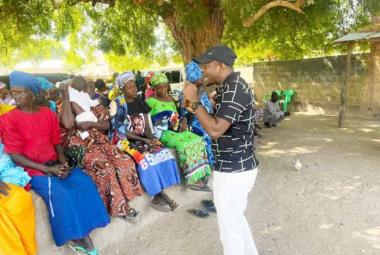By Ebrima S. Jallow
The Minister of Finance and Economic Affairs acting under Section 152 (1) (amended) of the 1997 Constitution and Section 21 (1) of the Public Finance Act (PFM Act, 2014) submitted for consideration and approval by the National Assembly, the Estimates of Revenues, Recurrent and Development Expenditures for The Republic of The Gambia for the Fiscal Year, 2024. Considering that the Ministry is responsible for the overall coordination and formulation of the annual budget, in line with both the Constitution and the Public Finance Act, 2014.
The 2024 Budget is anchored on the reduction of the overall fiscal deficit, including the gradual reduction of net domestic borrowing as a percentage of GDP over the medium term. For this reason, the ministry intends to pursue rationalization of expenditure, improving domestic revenue mobilization and innovative non-debt revenue-creating initiatives (Asset Recycling Program), restructuring the debt profile to reduce the burden of debt and focusing on concessional financing of infrastructure projects identified in the Green Recovery-Focused National Development Plan (RF-NDP).
As a result, the Draft 2024 Budget Estimate has been prepared based on the objectives of consolidating recovery and accelerating reforms to build economic resilience and improve the well-being of the population. To this end, the Draft Estimate is focusedon an improved domestic resource mobilization drive that supports the provision of quality essential services in education, health, agriculture, and infrastructure development to promote more inclusive and resilient growth.
On the macroeconomic front, provisional data estimates show that Real Gross Domestic Product (GDP) growth for 2024 is projected at 4.9 percent, lower than the 5.3 percent recorded in 2021 when recovery from the pandemic was underway but slightlyhigher than in 2023. Thissteady growth performance results from the spillover effects of the Russia-Ukraine conflict, which has severely dampened growth prospects. Previously, optimistic projections have been revised downwards owing to increasing interest rates to counter rising price levels.
Real GDP growth is projected at 4.8 percent in 2023. On sector-specific growth outlooks, agriculture is projected to continue on its growth path reaching 8.3 percent in 2023, compared to 3.6 percent in 2022, primarily supported by crop production, fishing, and aquaculture. The growth prospect for the industry sector is estimated to increase to 7.4 percent in 2023 from 3.0 percent in 2022mainly supported by electricity and construction. On the service sector, growth is expected to subdue at 2.5 percent in 2023, with rebound activities in the tourism, and wholesale and retail trade subsector. Tourism is expected to recover from the COVID disruption by 2026 when the arrival of tourists reaches pre-COVID arrivals.
In terms of outlook, growth is projected to moderately rebound to 4.9 percent in 2024 and strengthen further in the medium term at an average of 6.1 percent growth per year. Going forward, the agriculture sector is expected to be the main driver of growth in the medium term. As the West grapples with the spillover effects of the war in Ukraine, lower real incomes and higher interest rates are creating volatility and affecting the prospects for tourism and trade.
The overall budget execution for the first three quarters of 2023 is on track as the outturn is eight percent below the projection. The overall spending is in line with the projections due to the decline in recurrent expenditures in line with fiscal prudence.
Revenues and grants for the first nine months of 2023 amounted to D19.2 billion representing an overperformance of 28 percent against its projections. This overperformance is mainly emanating from a 28 percent increment in tax on international trade, a 3 percent increment in non-tax revenue, and D900 million dividend payment by CBG.
During the first three quarters of 2023, tax revenue amounted to D10.4 billion compared to the projected figure of D9.9 billion, reflecting a slight increase in performance by just over 4 percentage points. This increment is highly influenced by a rise in taxes on international trade on both oil and non-oil and the decline in fuel subsidies. In addition, the measures taken by the government to decongest the Seaport, expand the berthing space for shipping lines, and improve handling equipment, all contributed to the increase in import volumes.
On debt interest, D2.46 billion has been utilized up to the end of September 2023, representing a disbursement rate of 81.8 percent of expected outturn, of which D1.96 billion or 79.4 percent of actual interest expense was domestic. Other Charges expenditures reached D5.97 billion, of which Goods and Services represent D2.46 billion, and Subsidies and transfers represent D3.51 billion. The projected outturn for Other Charges for the fourth Quarter is D2.79 billion while the end-year total is projected to be D8.774 billion.
The outturn for Capital expenditures for the third quarter was D9.34 billion and it is projected at D13.79 billion by the end of 2023. Personnel cost as at the end of the year is estimated at about D600 million above the approved budget of D6.10 billion.
Total Revenue and Grants for 2024 are projected to reach D34.93 billion, representing a growth of 5 percent compared to the 2023 budget of D33.22 billion. Tax revenue is expected to increase by 24 percent due to improvements in economic performance and enhancements in tax administration through digitalization and compliance.
Non-tax revenue is expected to increase by 86 percent due to partially anticipated receipts of $10 million from the arbitration award and the payment of the first tranche of $15 million from the Trans-Gambia Asset Recycling Program.
Total Expenditure and net lending are projected to increase slightly by six percent, rising from D37.15 billion in 2023 to D39.38 billion in 2024. This increase is mainly driven by increases in Debt Interest, which is projected to increaseby 76%. Personnel Emolument expenditures are also projected to increase from D6.10 billion (revised to D6.7 billion for unplanned recruitment) in 2023 to D7.43 billion in 2024.
Meanwhile, Goods and services from the use of both Donor and Government resources are projected to be D9.84 billion in 2024, representing a one percent decrease compared to 2023. Similarly, capital expenditures are expected to decline by 12 percent. The decline in the budget for both Goods and Services and capital expenditures is associated with the decline in project grant disbursement from 2023 to 2024 due to the over-projection of project funds which has been largely corrected for 2024.
Meanwhile, Subsidies and Transfersincluding Subventionsare projected to increase by D599 million to D4.96 billion in 2024, compared to D4.34 billion approved for 2023. This increase is partly due to the increases in subventions for the GRA, Hospitals, Schools, GBOS (Census), and the inclusion of new subventions such as the MCC Compact Coordination office, the Victims Commission, and SOE Commission. Input subsidies for fertilizer also increased by D100 million.
Debt service interest payment is projected to be D5.11 billion in 2024 from D2.19 billion in 2023, representing an increase of 76 percent. Overall, Debt service (interest payments plus foreign amortization) is projected to reach D7.49 billion in 2024. The increase in the Debt service for 2024 is a result of the large increase in interest paymentsdue to an increase in the Marginal Propensity to Consume (MPC) rate to17% which translatesto higher interest payments on the 30-year bond and other domestic debts and the anticipated rollover of other government securities.
The 2024 budget deficit will be financed mainly from domestic financing and borrowing from our development partners. In essence, the Gross Deficit is estimated to reach 2.55 percent of GDP compared to 3.59 percent of GDP. This is a deficit reduction of 29% from the 2023 budgetcompared to the 2024 Budget. This deficit reduction strategy will be sustained in the near term in order to reduce the elevated debt level. Thedebt to GDP ratio was about 83% in 2022 and is now on a downward trendand the deficit reduction strategy anchored on robust domestic resource mobilization and fiscal expenditure prudence will be sustained for a more robust financial position.
In conclusion, it is important to note that global economic and geopolitical developments coupled with climate change have exposed the world economy in general and the Gambian economy to a poly crisishence the challenges of economic management. However, there is an expectation of a stronger economy with a gradual decline in inflation as the inflation-fightingstrategies of both monetary and fiscal policies begin to take effect in a heightened global inflation environment. The planned decline in fiscal deficit as a percentage of GDP over time will help to reduce the overall debt ratio in the medium term, which will be supported by strong domestic resource mobilization and containment of expenditures.







